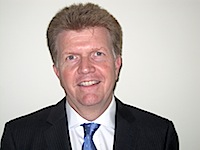 MeetingZone has officially disclosed its ambition to be Europe's leading provider of UCaaS solutions and heading up its Skype for Business practice is General Manager Andy Clark who revealed the company's ambitious channel growth plan.
MeetingZone has officially disclosed its ambition to be Europe's leading provider of UCaaS solutions and heading up its Skype for Business practice is General Manager Andy Clark who revealed the company's ambitious channel growth plan.
Set-up in 2002 by current CEO Steve Gandy, MeetingZone first operated as a provider of high quality audio conferencing services. Today, the independent global business has headquarters near Oxford and offices in Germany, Sweden, USA and Canada, and offers UC, conferencing and collaboration services. Its portfolio and service wrap are available to partners to re-sell either under a referral model or as a wholesale white labelled solution.
MeetingZone provides Skype for Business, Cisco WebEx, Glance Screen Sharing as well as its own audio conferencing services - all augmented by a neat service wrap that includes account management and training. In March 2013 the company bought Atia Communications, a Microsoft certified Skype for Business/Lync specialist with more than 400 supported Microsoft Server UC deployments across the world. MeetingZone's international expansion is significant with a two year average sales growth of 72 per cent, placing the firm at number 30 in the Sunday Times BT Business SME Export Track 100 2015.
MeetingZone also achieved 11 per cent compound annual growth over the last five years and forecasts £21 million this financial year. The company's 110 staff support 5,000 customers globally, including many of the FTSE 500 companies in the financial, retail, IT, pharmaceutical, not for profit, business services and legal sectors.
The main development in the business during recent years has been its shift towards providing a broader range of conferencing and collaboration services through reselling Microsoft's Skype for Business and Cisco WebEx. "We're also moving towards a recurring monthly licence revenue model that will benefit partners by providing a regular secure revenue stream," said Clark. "This has been introduced as we foresaw the customer demand for more integrated, easy to use conferencing and collaboration tools."
Target partners include system integrators and telecoms providers. "Resellers are a key component, and our partner programme has been designed to align with different business models to encourage growth," explained Clark. "Partners allow us to increase our reach, so we provide them with the latest sales support, marketing materials and other collateral. This can be MeetingZone branded or white labelled - either way these services are available alongside billing and regular communication. We also provide partners with a portal that allows them to manage their customers and access resources quickly and easily."
With the launch of its new Skype for Business as a Service platform, MeetingZone is focusing on partners who want to offer hosted Microsoft UC solutions without the need for capital investment. "Our priorities are to help partners achieve their goals by guiding them on what they need to succeed," added Clark. "As a UC, conferencing and collaboration specialist, MeetingZone offers Skype for Business and WebEx and full integration with our audio conferencing solution. This enables us to offer the full range of UC services from IM and presence all the way through to enterprise voice and PBX replacement."
According to Clark, more companies are embracing UC because it improves the effectiveness and efficiencies of their organisations. He's witnessed this interest first hand and noted that IM is becoming a popular feature, although there is still an increasing impact on audio, video and content usage with access via a UC client. "Our strategy is based on liberating people and enabling them to connect, communicate and collaborate," he stated. "Our service wrap differentiates us for both direct customers and our partners as we focus on training and support, while all of our technology is deployed with a dedicated account manager."
The role of resellers and SIs has been evolving for several years. However, many resellers have not yet embraced new technologies and business models, while others are mid-journey. "I see the evolution happening in a number of different ways, with many resellers and SIs reviewing their go-to-market strategies around UC&C and working to understand their role and how they can provide customers with a raft of different solutions," added Clark.
Weighing up which technologies to take to market is all well and good but resellers also need to offer different methods of deploying them, according to Clark. "While on-premise still provides great opportunities, cloud and hosted deployments are growing in popularity and most analysts suggest that this growth will only continue," he commented. "Therefore resellers need to understand how to drive a cloud strategy. Many resellers will need to re-invest or potentially find a good partner that specialises in the complementary technologies they want to drive to market."
